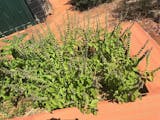The Asian vegetable 'Pak Choi' is an annual type of cabbage originally from southern China and since the 5th century. Century after Cristus is grown. The close relative of the Chinese cabbage forms loose heads with bright leaf ribs. The aromatic, dark green, large and crisp leaves, are a nutty, spicy and slightly bitter addition to mixed salads and stir-fried vegetables, and can be prepared in a similar way to chard or fresh spinach. Pak Choi is hardy in mild climates, but in cooler areas the variety needs light winter protection. Not suitable for storage.
General information
Plant family: Brassicaceae
Life Cycle: One year
Days to harvest: 50 days
Plant height approx.: 40 cm
Root Type: Deep Root
Nutrient requirements: Strong Eaters
Water Requirements: Means
Winter hardiness: Up to-5 °C
Location: Sunny to partially shaded
Floor: Permeable, moist, loamy, humus, rich in nutrients
PH: 6.5 to 7
Sowing and planting information
Germ Type: Dark germ
Seed Depth: 0.5-2 cm
Optimal germination temperature: 18-22 °C
Germination time: 7-10 days
Planting, row spacing: 30x40 cm
Optimal mixed culture: Basil, marigold, marigold, marigold, marigold, rosemary, spinach, soy, beans, peas
Unfavorable mixed culture: Kohlrabi, onion, garlic, mustard, radish, radish, other types of cabbage
Subtropic climate (Mediterranean) (e. g. B. Portugal, Spain, Italy)
In autumn with falling temperatures from September to November, sow directly into the open air. We recommend pre-cultivation in small bowls from September to November.
Moderate climate (e. g. B. Germany, Switzerland, Poland)
Sow directly into the open air in autumn from late July to September and plant for wintering from mid-September to early October. We recommend pre-cultivation in small bowls in autumn from July to September.
General
At Pak Choi, we always recommend pre-culture, for this purpose, let the seedlings grow in a small bowl up to the first visible cabbage leaves, then pique them into the desired container. After peckering, let the seedlings grow at moderate temperatures until they are planted out as seedlings. The planting of the seedlings in the bed is carried out from the 2nd Pair of leaves after the cotyledders. Chinese cabbage vegetables Prefers a sunny to partially shaded location with permeable and nutrient-rich, humus-rich clay soil. Prepare the soil with deposited animal manure. Avoid waterlogging.
Additional tips
Pak Choi is harvested as a whole head. To prevent the laying of eggs from cabbage flies, we recommend the use of vegetable protection nets. In order to quickly obtain a fine, crumbly and well-drained soil, an additional incorporation of biochar and primeval rock flour is recommended.
Type of propagation
Spread occurs via seeds.
Care Plants
Regular and uniform watering is important for Pak Choi for the growth of the plants. M It animal manure prepared beds and planting in mixed culture, replaces additional fertilization.
Germination ability of seeds: 3-4 years
Other Names
Botanical names: Brassica rapa ssp. Pekinensis.
English Names: Asia mustard vegetable
German names: Asian mustard vegetables
Portuguese names: Vegetal de mostarda asiática
Spanish Names: Verdura de mostaza asiática
French names: Légume moutarde d'Asie



![Asian vegetables Pak Choi [Brassica rapa ssp. Pekinensis]](http://www.benjis.net/cdn/shop/files/AsiagemuesePakChoi-Brassicarapassp.pekinensis-Vegetaldemostardaasiatica-www.benjis.net.jpg?v=1705969575&width=1445)





